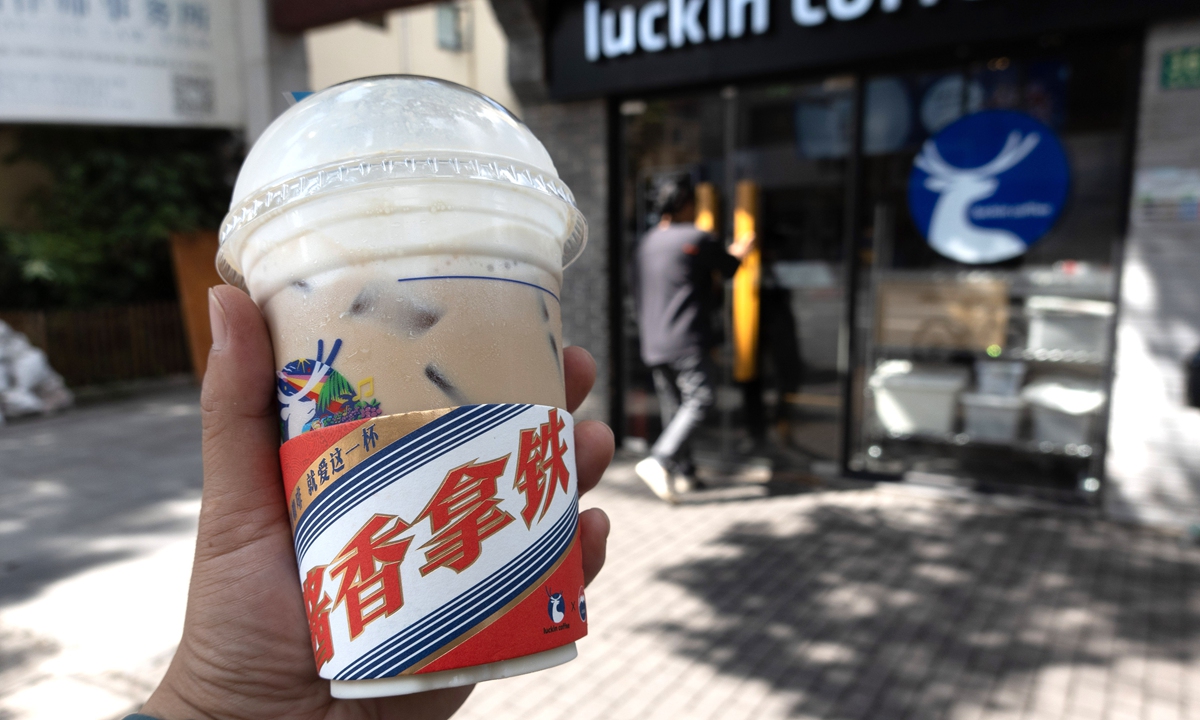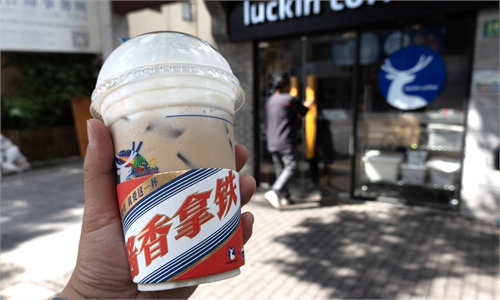Moutai coffee an instant hit, highlighting innovation as key to attracting young consumers: experts

Jiangxiang Latte Photo: cnsphoto
A type of alcohol-infused coffee jointly launched by Chinese high-end liquor brand Kweichow Moutai and coffee chain Luckin has proved hugely popular, creating a sensation among young consumers in the last two days. Experts noted on Wednesday that innovation is the “winning formula” for captivating young people.
Due to her daily car commute, Cindy Qin, a Beijing resident, didn't join the initial rush to taste the trending beverage. “I grabbed a cup to try it out yesterday. To do this, I even took the subway to work,” Qin told the Global Times on Wednesday.
“It seems that everybody in China knows Moutai, but I never tried it before, so I was kind of curious when this coffee came out,” Qin said.
Posts of trying the innovative beverage have gone viral since the coffee launched on Monday. Luckin said on Tuesday that it sold more than 5.42 million cups of the Moutai latte on the first day of its launch, setting a new sales record for the Chinese coffee chain.
Though the beverage, currently on sale at a discount price of 19 yuan ($2.6), is not expensive, it shows that young consumers are more than willing to pay for innovative products, and that innovation-driven development is key for brands to win market share in China, experts said.
“Time-honored brands and traditional high-end brands generally have an excellent reputation for quality, but they also want to attract more young consumer groups,” Zhang Yi, CEO of iiMedia Research Institute, told the Global Times on Wednesday.
“And the spending power of the younger demographic cannot be underestimated, especially that of those born in the 2000s. They possess significant consumer potential and are increasingly inclined toward the cultural context of products or services,” Zhang said.
The alcohol-infused latte is an effective and successful attempt to tap into this, experts said.
“Traditional industries need to actively seek innovation and breakthroughs to better cater to ever-evolving consumer preferences,” Zhang noted.
Moutai will soon roll out liquor-flavored chocolate, according to media reports.
In fact, there have been numerous similar cross-brand collaboration products. Just recently, the renowned French luxury brand LV joined forces with Chinese coffee chain Manner to introduce a limited-time bookstore event in Shanghai. The books in the stores range from a minimum of 290 yuan to nearly 20,000 yuan. Customers who purchase two books receive a free LV canvas bag. Therefore, to get an eco-friendly LV bag, a consumer would need to spend a minimum of 580 yuan.
According to media reports, in front of the “coffee plus book” shops, there were long lines of customers.
“The same logic applies to the operations of foreign brands in China. They should excel at grasping consumer preferences and promptly and accurately meeting their spending psychology,” Zhang said, refuting foreign media hype about a deteriorating business environment for foreign companies in China.
China has ramped up efforts to improve its business environment over the years and there’s no doubt that the Chinese market is crucial for the growth of many multinationals, experts said.
Senior executives of global companies have been flocking to China since March this year, including Microsoft founder Bill Gates, Tesla CEO Elon Musk, Apple CEO Tim Cook and LVMH owner Bernard Arnault. Defying calls in the West for "decoupling" or "de-risking," they expressed their intent to expand investment in China.
As the new generation of consumers is rapidly emerging, successfully capturing shifting consumer preferences with innovative products and service is the key to tapping into the market in China, and this principle applies equally to both domestic and foreign brands, Zhang noted.

